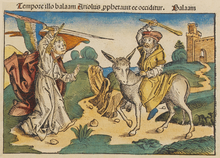Balak (Sidra)

Balak ( Hebrew בָּלָק) denotes the reading section of the Torah from Numbers / Bemidbar 22.2–25.9 (22.2–41 BHS ; 23 BHS ; 24 BHS ; 25.1–9 BHS ).
It is a reading in the month of Tammuz .
Contents sketch
Balak , the king of Moab, sends messengers to the seer Balaam to stop the advance of the Israelites from Egypt with a curse . After Balak's second invitation, YHWH lets Balaam go with his donkey, which shrinks from the angel of the Lord on the way and was beaten by Balaam.
Balaam wants to curse the people of Israel for Balak, but he also wants to belong to God, who said that his people are blessed. On the mountain heights, Balak had seven altars built on behalf of Balaam, on which Balaam and Balak sacrifice. With the offering of these sacrifices , the desired curse that Balaam is to utter turns into a threefold Ma Touzu blessing , which begins like this: "How beautiful are your tents, Jacob, how beautiful are your homes, Israel." (Numbers 24: 5)
Balak became angry with Balaam, who stated that he could not go against the Lord's command for gold either. This is followed by an oracle and a vision of the future Balaam for the people of God, before Balak and Balaam part again.
Change of scene: In the Jordan Valley near Jericho , the Israelites had sexual contact with Moabite women and sacrificed their Moabite gods. Thereupon the God of Israel became angry and Moses ordered the judges of Israel to kill all who had got involved with the Moabite god Baal- Peor. Pinchas , a priest, pierced an interfaith couple with a spear, ending an epidemic that killed 24,000 people.
Haftara
The associated Haftara is Micha 5,6–6,8 (5,6–14 BHS ; 6,1–8 BHS ).
Literature (selection)
- David Sander: BALAK . In: Jewish Lexicon . tape I . Jewish publishing house, Berlin 1927, Sp. 688 ( uni-frankfurt.de ).
- Selig Bamberger (translator): Raschi's Pentateuch commentary. Fourth edition, Basel 2002, pp. 473–486.
- Sidratext Bemidbar / Numbers 22.2-25.9. after the Codex L . In: tanach.us. Retrieved October 8, 2017 .
- Haftaratext Micha 5,6–6,8. according to the Codex L. In: tanach.us. Retrieved October 8, 2017 .
Web links
- Walter Rothschild : Balak - Little has changed. In: ark.de. General Rabbinical Conference, July 11, 2014, accessed April 28, 2018 .
- Walter Rothschild: Balak - the own in mind. In: ark.de. General Rabbinical Conference, June 28, 2013, accessed April 28, 2018 .
- William Wolff: Balak - The donkey sees more than the prophet. In: ark.de. General Rabbinical Conference, July 6, 2018, accessed December 21, 2018 .
- Rabbi Dr. Simon Bernfeld: Jewish translation by Balak. In: talmud.de. talmud.de, May 6, 2020, accessed June 2, 2020 .
Individual evidence
- ↑ Hanna Liss: Tanach - Textbook of the Jewish Bible . 3. Edition. Universitätsverlag Winter GmbH, Heidelberg 2011, ISBN 978-3-8253-5904-1 , p. 154 (414 pp.).